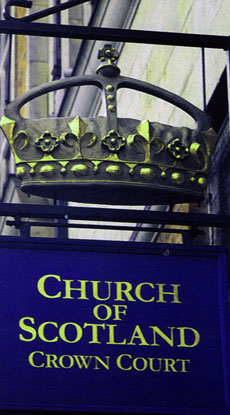London Gaelic Services.
Seirbheisean Gàidhlig Lunnain.

| Our History - Background. |
| Summary | Gaelic Services | Order of Services | Background | Dual Services
In 1753 the Metrical Gaelic Psalterof 1694 was revised. In 1767 the New Testament was translated into Scottish Gaelic by the Rev. James Stuart of Killin. Ten Thousand copies of this translation were distributed throughout the Highlands and in many of the Parish Schools the newly produced "Gaelic Testament"was a reading text-book. The Rev. Dr. John Stuart of Luss, Son of the aforementioned Rev. James Stuart of Killin, with others, completed the Old Testament by 1801. Thus the Gaels of Scotland had the complete Bible in their own language at the very beginning of the 19th Century. The initiation of Scottish Gaelic services in London cannot be ascertained with absolute veracity but we do know that services in "the mother tongue" were held for soldiers serving in the Peninsular Wars somewhere in London. In 1809 a meeting was institiuted for the purpose of erecting or alternatively purchasing a London Gaelic Chapel in accordance with the temporal and spiritual rites of Scottish Presbyterian regulations. The Subscription List is headed by Royalty, Titled Personnel and many Highland names as well as others. By 1813 the Chapel was dedicated and opened for worship. Later, after a few years, it became known as "The Caledonian Church" where the Rev. Edward Irving was minister. From 1828 onwards his views involved him in the charge of Heresy resulting, after some time, in his ejection from the church and deposition from the ministry of the Church of Scotland. This drama had serious consequences for the Gaelic-speaking adherents of the faith and, among other things, brought to an end the presence of regular Gaelic worship in London for quite some time. In parenthesis it should be added that more recently, the current Secretary, Mr Norman MacLeod, approached the then GLC Blue Plaque Assessment Committee to place a commemorative Blue Plaque, for historical reasons on Edward Irving's residence in London. It can be seen at Amwell Street, Islington and states simply - Edward Irving (1792 - 1834), Divine, lived here. After his ministerial deposition, he founded the Catholic Apostolic Church and, by them, is regarded as the father of the Charismatic movement. |